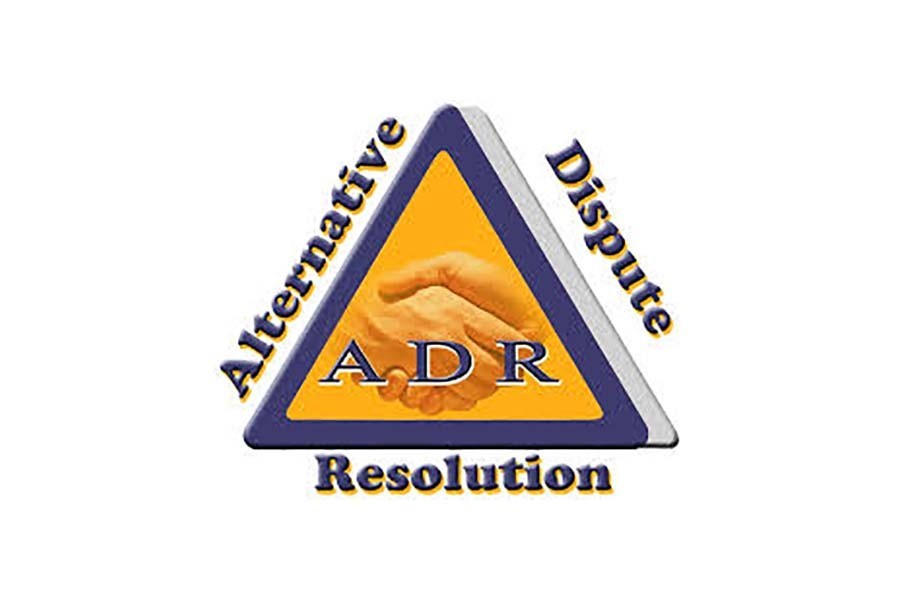
Published :
Updated :

Alternative dispute resolution (ADR) is a widely accepted and appreciated method for reducing the number as well as cost of legal suits in many countries. Many developed and developing countries have gained tremendous success in reducing backlog by adopting ADR.
Disposal of suits and litigation through ADR is bound to enhance the quality of social justice and thereby contribute to the promotion of harmony and peace in the society -- both of which are pre-conditions for meaningful development in social, cultural economic and other spheres. Actually, mediation, conciliation or reconciliation, arbitration and other forms of ADR are important vehicles for promoting social harmony. Besides, ADR is an alternative route for reaching a speedier and less-expensive mode of settlement of disputes. It includes mediation, settlement of disputes, arbitration and other ways that are voluntary and not compulsory.
Most countries of the world have adopted ADR mechanism and achieved tremendous success in reducing backlog and increasing access to justice for the poor. In Bangladesh, the concept of ADR was first inserted in Section, 10(3) and 13(1) of the Family Court Ordinance of 1985, wherein there is provision for compromise or reconciliation even before pronouncement of judgment.
However, there was no implementation of these provisions until a special pilot project was taken on 'Mediation as a measure of ADR' in 2000, under the supervision of the then chief justice of Bangladesh. Under that project, three assistant judge's courts of Dhaka were specified as exclusive Family Courts for the purpose of mediation.
At that time, a circular was issued from the High Court Division of the Supreme Court providing credit of two trials for one successful mediation in a family dispute and the credit of one trial for two unsuccessful mediations. This circular inspired the Family Court judges to give more efforts to mediation in Family Court cases, achieving success in disputes resolution through 'mediation' in the family courts.
The success in realisation of dower money and amicable, peaceful and quick settlement of disputes through mediation in the Family Courts inspired the government and the policy makers to widen the scope of ADR.
Accordingly, ADR mechanism was introduced for the first time in general civil litigation in 2003 by the Code of Civil Procedure, and by the Artha Rin Adalat Ain respectively. The Code of Civil Procedure (Amendment) Act, 2003 embodied two new sections (89A, 89B) designed for ADR mechanism in all civil suits and cases. The mechanism of ADR in the Artha Rin Adalat was given the look of settlement conference, to be presided over by the trial judge and held in camera.
With the increasing need of ADR, the role of the Bangladesh International Arbitration Centre (BIAC) came to the limelight. It deserves appreciation for making substantial progress in promoting the concept of ADR among various stakeholders including the government, banks and financial institutions, corporate houses and lawyers. Law and policy makers have realised the need for alternative measures where mediation has started to feature in a subtle but definitive way.
According to the statistics, around 3.3 million cases are now pending with courts. It is destined to reach a staggering figure of 5.0 million by 2020. There is only one judge for around 2,000 cases and on that note, ADR can play an important role.
Analysts say teaching and promoting the ADR at undergraduate and university level is very important because it would develop a culture where litigation would not be preferred or promoted and will also change the mindset of the people. There is the need for introducing ADR courses in legal education.
The fact remains that ADR can resolve disputes amicably at low cost and less time. The present legal education system in Bangladesh failed to give enough priority to this important area.
Since 2011 to date, the BIAC has not only facilitated 269 hearings on numerous ADR cases but also organised many arbitration training courses, mediation training courses and negotiation training courses including some courses conducted abroad.
The BIAC has made a number of achievements in applying best practices of the ADR in the country by facilitating arbitration and mediation and also by arranging training programmes on ADR for representatives from the banks and financial institutions, legal fraternity, corporate institutions and students of law.
The government, in the meantime, is working on incorporation of ADR in different existing laws in order to make the dispute resolution system easier and less time-consuming. Many economists are now praising the role of the BIAC for settling commercial disputes out of court during the last seven years.
In India, the authorities introduced the Insolvency and Bankruptcy Code two years ago which forces parties to go for arbitration as a prerequisite to invoke liquidation clause. Bangladesh needs ADR-friendly legislation reforms and should engage institutions like BIAC so that international commercial arbitration cases from abroad can be held in Bangladesh instead of only being directed to Singapore.
However, mere inclusion of ADR clauses in contracts is not enough unless laws are amended to make their enforcement easier. In this connection, mandatory provision of arbitration and pre-litigation mediation must be included in the proposed legislation.
It is good to learn that the BIAC along with Bangladesh Bank and Association of Bankers in Bangladesh (ABB) is working on a draft guideline for the banking industry to resolve commercial and financial disputes, using ADR. Some laws were formulated earlier to encourage the ADR system, but the people were not getting its result as there is no legal aid office at the district level.
The government should, in the circumstances, hasten the process of popularising the ADR system without any delay. Such effort should get prime importance in view of the fact that ADR process can be of great help in strengthening the legal framework, which, in turn, can certainly bring about changes so that people can get justice speedily.


 For all latest news, follow The Financial Express Google News channel.
For all latest news, follow The Financial Express Google News channel.